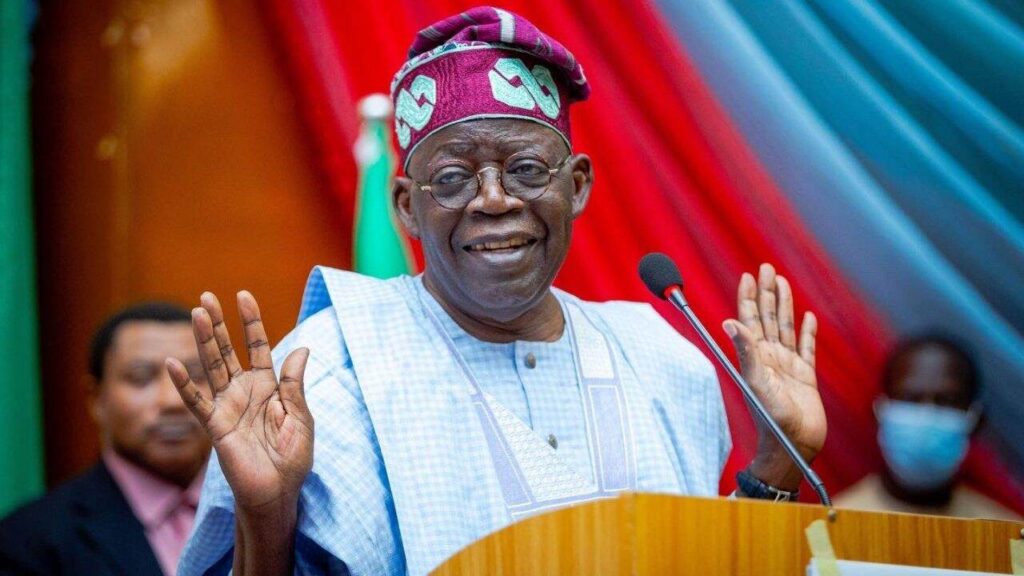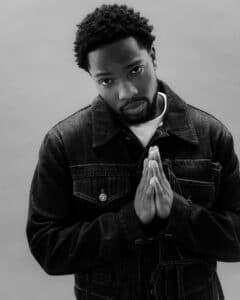
Bola Ahmed Tinubu (born May 29, 1952) is a highly influential and widely recognized Nigerian politician and accountant, currently the president-elect of Nigeria.
Tinubu previously served as the governor of Lagos State from 1999 to 2007, where he played a vital role in shaping the development and administration of the state.
In addition to his governorship, Tinubu served as a senator representing the Western Lagos State during the Third Republic, which was a relatively brief period in Nigerian political history.
Early Life & Career
Bola Ahmed Tinubu, a prominent Nigerian politician, was born and raised in Lagos State, Nigeria. He spent his formative years in the southwestern region of the country. Tinubu received his primary and secondary education in Lagos before deciding to further his studies in the United States. He enrolled at Chicago State University to pursue a degree in accounting.

While in the United States, Tinubu completed his postgraduate studies at Richard J. Daley College and continued his education at Chicago State University. He graduated successfully in 1979, earning a Bachelor of Science in Accounting.
After completing his studies abroad in the 1990s, Tinubu returned to Nigeria and began his professional career. He secured employment at various prestigious firms, including Arthur Andersen, Deloitte, GTE, and Mobil Nigeria, where he worked as an accountant. His experience in the field developed in him a strong foundation in finance and business.
However, Tinubu’s aspirations extended beyond the corporate world. He ventured into politics and sought to make a difference in his homeland. In 1992, he applied as a candidate for the Lagos West Senatorial seat under the Social Democratic Party (SDP). Although unsuccessful in his bid, this marked the beginning of his political journey.
Tinubu emerged as a passionate activist and actively advocated for the restoration of democracy in Nigeria. He became an important member of the National Democratic Coalition Movement, which aimed to bring about democratic reforms in the country.
Over the years, Tinubu’s political career continued to flourish. He became a key figure in Nigerian politics, particularly within the All Progressives Congress (APC) party. Tinubu’s strategic influence and leadership skills have earned him widespread recognition within his party and nationwide.
Political Career
Bola Ahmed Tinubu‘s political career took significant strides during the 1990s. In 1991, he joined SDP, the Social Democratic Party in Nigeria, and emerged as a prominent figure. His leadership qualities and dedication to public service earned him the opportunity to run as a senatorial candidate for the Lagos West constituency during the Third Republic.
Tinubu‘s commitment to democracy and desire to restore democratic values in Nigeria led him to join the pro-democracy movement known as the National Democratic Coalition (NADECO). The coalition aimed to mobilize support for the recognition of Moshood Abiola as the winner of the annulled June 12, 1993, presidential election.
During the regime of General Sani Abacha, which followed the annulment of the presidential election, Tinubu was forced into exile in 1994. He returned to Nigeria in 1998 following Abacha’s death, as the political landscape shifted in preparation for the transition to civilian rule.

As the 1999 elections approached, Tinubu aligned himself with leaders of the Alliance for Democracy (AD), including Abraham Adesanya and Ayo Adebayo. He garnered their support and emerged as the AD’s candidate for the position of Lagos State Governor. In a fiercely contested primary election, Tinubu triumphed over notable contenders such as Funsho Williams and Wahab Dosunmu, a former Minister in Nigeria responsible for Works and Housing.
In January 1999, Bola Ahmed Tinubu assumed office as the Governor of Lagos State and ran for the post along with The Alliance for Democracy (AD) party.
His unwavering commitment and diligent service to his homeland, Lagos State, has gained recognition as the Jagaban of Lagos State. This title signifies his esteemed position as a courageous and influential leader.
Tinubu has displayed remarkable determination in combating corruption and promoting democracy in his state and Nigeria. His relentless efforts have solidified his reputation as a dedicated leader to the betterment of Nigeria and its people.
The 2023 Presidential Election
There have been discussions and speculation about Bola Ahmed Tinubu‘s potential candidacy for the office of the President of Nigeria. Amidst growing political tensions, concerns over the Nigerian economy, and security issues, Tinubu made his intentions clear in 2023 by officially announcing his candidacy for the presidency. This announcement sparked considerable attention and anticipation as Nigerians awaited further developments in the political landscape.
Tinubu’s announcement was met with mixed reactions from Nigerians, with some expressing support for his candidacy, while others criticized his political track record and affiliations. Nonetheless, Tinubu remained resolute in his determination to run for the presidency.

The presidential election in Nigeria was held on February 25, 2023, with several political parties and candidates vying for the top position. Tinubu contested on the platform of the All Progressives Congress (APC), the ruling party in Nigeria, while his main opponents were Atiku Abubakar of the People’s Democratic Party (PDP) and Peter Obi of the Labor Party (LP).
The election was highly contested, with allegations of vote rigging and other electoral malpractices reported from various parts of the country. Despite these challenges, the Independent National Electoral Commission (INEC) declared Bola Ahmed Tinubu as the winner of the 2023 presidential election on March 1, 2023.
Tinubu’s victory was widely celebrated by his supporters, who praised his political experience and leadership qualities.
Controversies & Allegations
Bola Ahmed Tinubu has been a controversial name in Nigeria. He has been tagged with several allegations, including…
1. Corruption Allegations: One of the most prominent controversies surrounding Tinubu revolves around allegations of corruption. Critics accused him of amassing wealth through questionable means, including accusations of financial impropriety and misappropriation of public funds. These allegations range from the alleged mismanagement of funds as Governor of Lagos State to questionable financial transactions involving his family members and close associates.
2. Bullion Van Controversy: During the 2019 general elections, a viral photograph showed a bullion van parked at Tinubu’s residence in Lagos. The van was reported to carry a large sum of money on the eve of the elections, leading to vote-buying and electoral malpractice allegations. Critics argued that the incident raised questions about the source and purpose of the funds, especially considering Tinubu’s political involvement.
3. Political Patronage and Influence: Tinubu’s significant political influence within the All Progressives Congress (APC) party drew criticism from opponents who accused him of promoting a political patronage system. Detractors argued that his control and influence over key party structures and appointments undermined democratic principles and hindered the emergence of alternative leaders within the party.
4. Authoritarian Tendencies: Some critics raised concerns about Tinubu’s leadership style, accusing him of exhibiting authoritarian tendencies. They claimed that he stifled dissent within his party and marginalized opposing voices, limiting democratic participation and open debate. Critics also alleged that Tinubu’s style of governance centralized power, enabling him to control decision-making processes.
5. Human Rights Concerns: Tinubu’s administration faced allegations of human rights abuses, particularly concerning the treatment of political opponents and protesters. Critics argued that the government used excessive force to repress dissent and curtail freedom of expression in the country, citing instances of police brutality and harassment of activists.
Personal Life
Tinubu is known for his devout practice of the Islamic faith. He is presently married to Oluremi Tinubu, who currently serves as a senator representing the Lagos Central Senatorial District in Lagos. They entered matrimony in 1987 and have been blessed with three children: Habibat Tinubu, Zainab Abisola Tinubu, and Olayinka Tinubu.

Prior to his marriage to Oluremi Tinubu, Tinubu was previously married to Bunmi Oshonike, an air hostess and prophetess. They also had three children: Kazeem Olajide Tinubu, Folashade Tinubu, and Oluwaseyi Tinubu.
Tragically, Tinubu experienced the loss of his mother, Abibatu Mogaji, a prominent figure in Nigeria, who passed away on June 15, 2013, at the age of 96. Additionally, he faced the heartbreaking loss of his son, Jide Tinubu, on October 31, 2017, in London.
Net Worth
Tinubu is widely recognized as one of the wealthiest politicians in Nigeria, with an estimated net worth of approximately US$4 billion. His financial success is evident through his diverse portfolio of properties and companies spanning across Nigeria and beyond.
Additionally, Tinubu owns a private Bombardier Global 6000 Express jet, which is worth over $75 million amidst his expensive cars.







